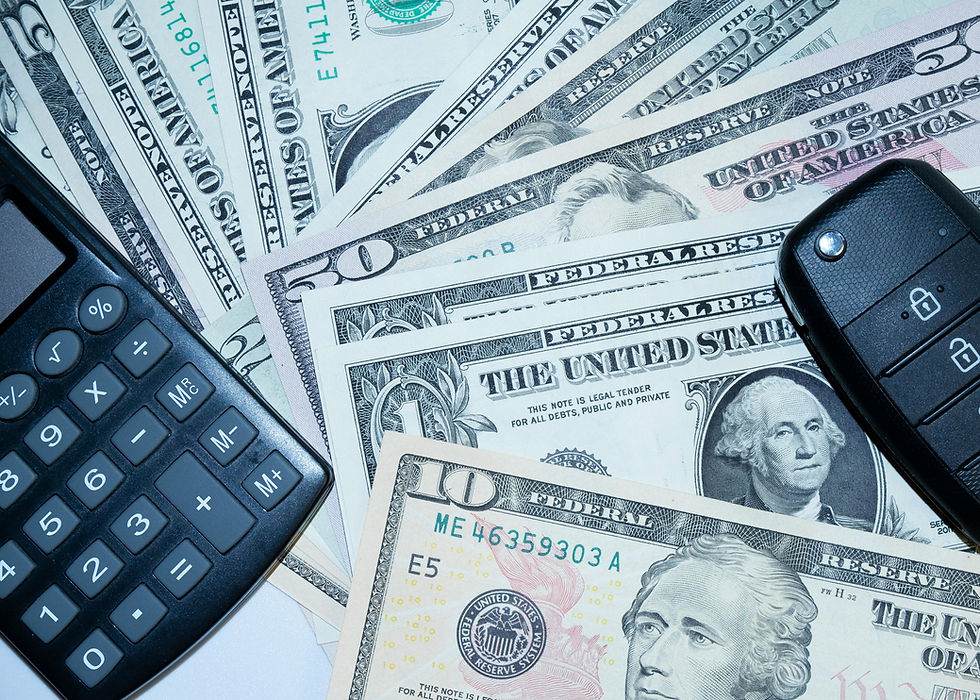Many Americans Are Struggling with Credit Card Bills and Auto Loans — Here's what you can do
- David Peters

- Oct 8, 2024
- 3 min read

In recent months, we’ve seen inflation slow down, which might make you think that the financial pressures on American households have eased. Unfortunately, that’s not the whole story. While inflation has cooled in some areas, consumers are still feeling the pinch—especially regarding everyday essentials like food. Prices in these sectors are still creeping up, which makes it difficult for many families to keep up with their expenses. The result? A rise in credit card debt and auto loan balances.
The Rising Debt Dilemma
Even though inflation has slowed, it’s still growing in areas close to home. Take food prices, for example—everyone has to eat, and when those costs rise, families have little choice but to spend more. With higher everyday costs, many Americans turn to their credit cards to make ends meet.
But here's the kicker: interest rates on credit cards and auto loans have also risen. That means people are relying more on credit and getting hit with steeper interest on those balances. This combination makes it challenging to pay off debt, which leads to a vicious cycle of accumulating interest, increasing balances, and struggling to keep up with monthly payments. It's a challenging hole to climb out of.
The Consequences of Mounting Debt
So, what happens when Americans can't pay off their debts? Eventually, something has to give. Many people will be forced to cut back on discretionary spending—dining out, entertainment, and even bigger-ticket purchases like electronics or vacations. This reduced consumer spending will have a cooling effect on the economy.
The big question is: When will this breaking point happen? How long can Americans sustain this pattern of growing debt before they have to pull back? When they do, the economy could slow even further, as less money circulates through various industries. This is a situation worth watching closely, especially if higher interest rates persist.
What Can You Do?
If you’re in a similar situation—juggling growing debts with higher interest rates—now is the time to take action. Start by creating a budget that reflects your current expenses and debt obligations. Prioritize paying off high-interest debt first, such as credit cards, before focusing on lower-interest loans like auto loans or mortgages.
At Peters Financial, we believe in empowering our clients with the knowledge and strategies they need to manage their finances. If you’re struggling to manage your debt, consider consulting with a financial advisor to explore options like debt consolidation, refinancing, or simply building a more sustainable financial plan.
Let’s face it: navigating rising debt in today’s economic environment is tough, but with the right strategies, you can take back control and set yourself up for a more secure financial future.
Have questions or want personalized financial advice? Our team would love to talk. Request an appointment and we'll be in touch.

About the Author:
David Peters, CPA, CFP, ChFC, CLU, CPCU, CGMA, is the Founder and Owner of Peters Professional Education (petersprofessionaleducation.com) and Peters Tax Preparation & Consulting, PC. David Peters is also registered with the U.S. Securities and Exchange Commission (SEC) as an Investment Advisor Representative (IAR) with Peters Financial LLC. He regularly teaches courses in accounting, finance, insurance, financial planning, and ethics throughout the United States, and regularly contributes regularly to various professional publications, including NCACPA’s Interim Report, SCACPA’s CPA Report, and VSCPA’s Disclosures.
Required Disclosure:
The content presented above is for informational purposes only, is general in nature, and is not intended to and should not be relied upon or construed as a financial plan or financial/investment advice regarding any specific issue or factual circumstance.
Financial and investment advisory services offered through Peters Financial LLC. Brokerage and custodial services offered through Charles Schwab Co. Inc., member FINRA and SIPC. Peters Financial LLC and Charles Schwab Co. Inc. are not affiliated. David Peters also offers tax services through Peters Tax Preparation & Consulting, PC. Peters Tax Preparation & Consulting, PC is not affiliated with Peters Financial LLC and clients or prospective clients are never obligated to use Peters Tax Preparation & Consulting, PC. as part of any financial planning or investment management services offered by Peters Financial LLC.
.png)



When everything feels like it’s getting more expensive groceries, gas, even your minimum payments it’s easy to feel overwhelmed. If you’re starting from scratch or trying to bounce back, MyMilestoneCard – Login to Activate Milestone Mastercard Account could help. Head to mymilestonecard.wiki to activate your card and manage it online. It’s made for people who need a clean slate and a simple way to rebuild trust with credit again. Every little step counts.